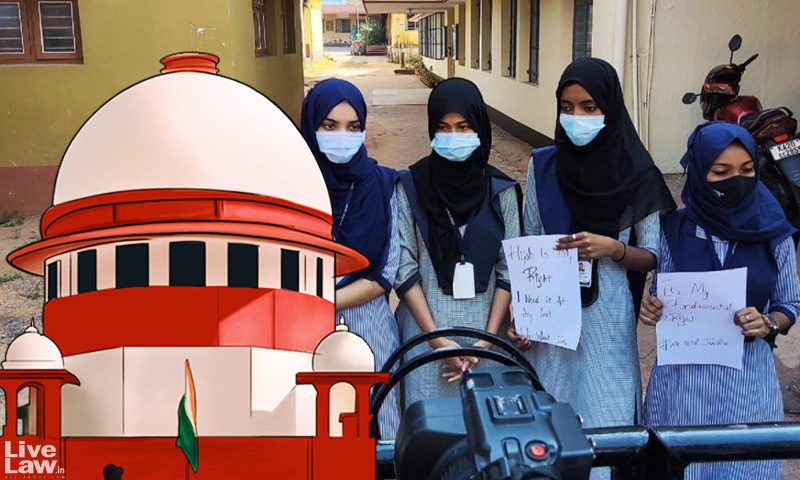The Islamic clergy organization Samastha Kerala Jem-iyyathul Ulama has filed an application with the Supreme Court for special leave against the Karnataka High Court ruling upholding the ban headscarf in classrooms after stating that the wearing of headscarves by Muslim women is not an essential religious practice of Islam.
The organization claims that the Supreme Court’s ruling is based on an erroneous interpretation of the Holy Qur’an and Hadith and a misunderstanding of Islamic law.
The petitioner refers to Sura 24 Ayat 31, Sura 33 Ayat 59 to explain that the Holy Qur’an speaks of the mandatory requirement for women to cover their heads and necks
“It is respectfully submitted that covering a woman’s head and neck in the presence of a man outside of her immediate family is the express dictum of the Qur’anic verses and is contained in the teachings of Muhammad, the Messenger of God and supreme leader of the Muslim community. Muslim women around the world have been following this practice in obedience to the Qur’anic dictum and the teachings of Muhammad since the time of Muhammad. Different types of veils are used by Muslim women at different times and in different parts of the world to cover their heads and neck separate from other garments to cover her body. Hijab is one such veil that was developed in modern times and has gained widespread acceptance due to its comfort and modesty. It is not the hijab but the purpose behind it i.e. to cover the head and neck properly, which is an integral part of Islamic teachings”, reads the petition filed by attorney Zulfikar Ali.
The petitioners’ organization, which consists of Sunni scholars, says that although the application of the judgment is limited to Karnataka, tThe legal proposal formulated there has greater implications nationwide. The petitioner says that it is the largest Muslim organization in South India and that it is submitting the request for special leave in the greater interest of the Muslim community.
It is argued that the High Court erred headscarf to be a non-mandatory practice on the grounds that no penalty is prescribed if not followed.
“Under the law, established by the Supreme Court in a series of judgments, it is not necessary for a religious practice to be accompanied by punishment or penance in order to pass the ‘substantiality test.’ If the Koran is the supreme source of law for Muslims, which specifically requires women to wear the headscarf so that its edges reach down to the bosom, the High Court has no right to insist on any associated penalty in order to protect the article 25 to receive for this dress code “, says the petitioner.
It is also highlighted that violating the explicit commandments of the Qur’an is forbidden and hence hijab is a mandatory practice.
“Analysis of the above mentioned Qur’anic verses and Hadis would show that it is farz (the commandments of the Qur’an) for women to cover their heads and necks and that it is forbidden to otherwise uncover the female body. According to Islamic jurisprudence, violating farz is haram (prohibited). Forcing Muslim girls/women to avoid covering their heads is therefore a violation of their right to follow the essential practice of their religion under Article 25 of the Constitution.”
The petitioner further claims that the Supreme Court relied on Abdulla Yusuf Ali’s comments in the footnotes of the Surahs to reach this conclusion headscarf is an essential practice.
“Footnotes by Yusuf Ali are only his personal opinion on the Qur’anic verses in question and their historical background. This opinion cannot be taken as a source of Islamic law, let alone that it could be given any credibility higher than Hadis.”, it says in the request. It is alleged that the Supreme Court mistakenly took two verses out of context and put them together to claim that the wearing of hijab is not obligatory in the Islamic faith.
To clarify that the petitioner does not want Muslim girls to defy the uniform rule, it is said that they are only looking for a reasonable accommodation to allow the headscarf to be worn in the same color as the mandatory dress code. The petitioner also says that enforcing absolute uniformity for citizens “would be seen as emulating Nazi ideology”.
“Wearing a hijab or similar headscarf of the same color as a Muslim girl’s uniform would not violate the ‘public order’ that the requirement for uniforms in educational institutions is intended to achieve. Forcing them to remove that headscarf as well, and insisting that all students wear it Uniform dress code in classrooms and enacting such a strict uniform dress code is anathema to the noble ideas of “pluralism” and “inclusiveness.” Government measures, Prescribing such a uniform pattern of dress for the entire student community fails only to pass the “reasonable restraint” test. established by this Hon’ble Court, but also challenges the cherished idea of ”unity in diversity” of which this nation has hitherto been proud. It is the petitioner’s respectful submission that such absolute uniformity for the citizens would not contradict the values of the Indian constitution but would be seen as an imitation of fierce Nazi ideology.it says in the request.
Last week, India’s Chief Justice rejected a request for an urgent listing of pleas in law challenging the judgment in the Hijab case. “Exams have nothing to do with this issue,” CJI Ramana had told lead attorney Devadutt Kamat, who made the citation on behalf of a Muslim student for urgent admission, saying the exams would start on March 28.

